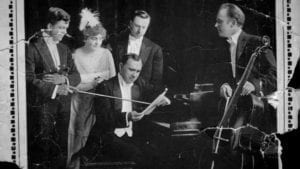Eustasio Rosales: Chicago’s First Hispanic Composer
Author: Daniela Pérez Giraldo
Program of Study: Master of Public Policy (MPP), Harris School of Public Policy (HAR)

(Source: The Archives of Eustasio Rosales. (2020, August). Retrieved from https://eustasiorosales.com/)
Description: Eustasio was a Colombia Opera Singer, who arrived at Chicago in 1900. He developed his music career in the city, reaching that the Chicago Symphony Orchestra played some of his work. The podcast explores the immigration barriers that Eustasio dealt with and the tribute that his great-grandson made in 2018.
Listen here:
Transcript (provided by author):
“Welcome to the ELI’s Finding Chicago Global Perspectives Podcast Series for AEPP 2020. I’m your host, [Daniela Pérez], and I’m currently enrolled in the University of Chicago’s [Harris School of Public Policy]. Today we will be exploring the life of Eustasio Rosales.”
The music that you listened at the beginning was from one Eustacio’s Opera, named Andina. The clip said, “I drink; I drink to love, Love in my mountains.”
Let’s discover the life of Eustacio, Chicago’s first Hispanic composer
Explanation
Why am I going to talk about a Colombian immigrant and music?
Colombia has been immersed in internal conflict for more than 50 years. From 1985 to 2018 Colombian government reported 7,9 million displaced people, where 550.00 have sought refuge abroad.
Music has served as a way of free us from the tragedy that a conflict of this magnitude means. Music has helped to tell our story.
Today I am going to tell a story that links Colombia and Chicago trough music and immigration.
Eustasio was born in Bogotá at the end of the 18th century. In 1893 visited Chicago and fell in love with the City. As a consequence, in 1900, he decided to move to Chicago as an immigrant composer.
At Chicago, Eustasio developed an extraordinary and outstanding music career. He was the conductor of a rooftop nightclub at the LaSalle, the historical luxury hotel located on the Loop between the years 1908 and 1976. Also, the Chicago Symphony Orchestra played some of his work. He is believed to have been Chicago’s first Hispanic composer.
But Eustasio story did not end with his dead 1934. In 2018, the Opera Andina, written by Eustasio 80 years earlier, was premiered at the Athenaeum Theatre.
Arlen, his great grandson, decided to give life to this Opera. The story about two men, Juan and Carlos, who fight for Rosa’s love that ends tragically with her dead.
But Arlen also found that his great grandparents story is of the family that fights against immigration discrimination.
Broader Issues
Eustasio married Mary Hyland, an American woman at the beginning of the 19th century. At the same time entered into force the Expatriation Act of 1907. The Act states that an American woman who marries an alien would lose her citizenship and take on her husband’s nationality.
Mary Hyland lost her citizenship, and with that, some of her rights. Under this law, women could be subject to deportation and had some employment restrictions.
Eusasio and Mary daughter and Arlen’s grandmother, Paula, explained, in some posthumous audiotapes, what fight against an immigration system means to her parents. Her mother lost her citizenship to marry the man that she loves. Paula said that that allows her to understand than an alien, as the Act of 1907 defining an immigrant, is not someone who came from mars, is just a good citizen, just not a U.S. citizen.
At Illinois nowadays, one in seven residents in the state is an immigrant, while another one in seven residents is a native-born U.S. citizen with at least one immigrant parent. That means that in 2018, Illinois had 1.8 million immigrants, comprised 14 percent of the population.
Eustasio chronicle was the same as many immigrants found in the U.S. the opportunity to build their dreams and escape from complex environments. However, at the same time is the story of many immigrants who fight against a complicated immigration system.
Conclusion + Music
When I started to search for a podcast topic, I am wondering what could link Colombia and Chicago. Found this story allows me to take an extraordinary journey through the Arlen documentary and Eustasio biography.
Not just Andina premiere was an exciting encounter, but also the story of a man who immigrates from Colombia to the USA, following his love for music and Chicago.
Found Chicago’s first Hispanic composer was Colombian, was an emotional and open-minded discovery.
Thank you for accompanying me on this journey, and thank you for listening.
References
American Immigration Council. (2020). Immigrants in Illinois.
Consultoría para los Derechos Humanos y el Desplazamiento – CODHES. (2017). Víctimas en el exterior, población exiliada y refugiada.
Parsa, A. (Director). (2018). The Way to Andina [Motion Picture].
Parsa, A. (2020, August). The Way to Andina. Retrieved from https://andinalives.com/music/
The Archives of Eustasio Rosales. (2020, August). Retrieved from https://eustasiorosales.com/
Leave a Reply
You must be logged in to post a comment.